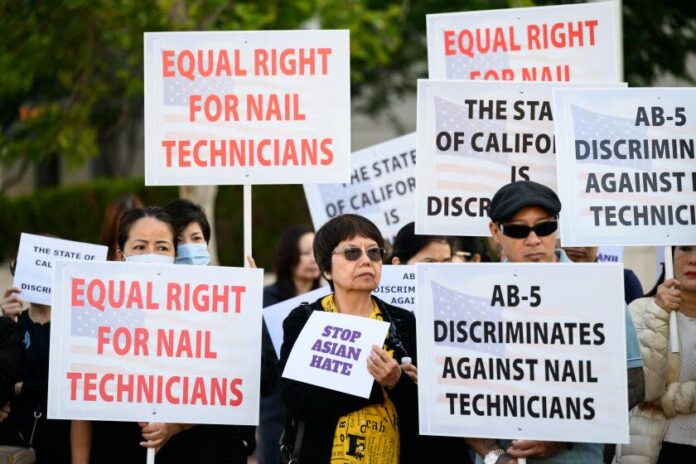
Community Flashpoints
- Immigrant-Run Businesses Face Crisis: California’s new labor code has upended Vietnamese-owned nail salons, forcing them to abandon long-standing independent work models or face crippling penalties.
- Selective Enforcement Sparks Outrage: Salon owners say California exempts other beauty professions while unfairly singling out nail technicians—raising claims of bias and double standards.
- The Immigrant Dream at Stake: The lawsuit centers on whether California’s policies are helping workers—or destroying decades of progress for Vietnamese immigrants and small business owners.
By Samuel Lopez – USA Herald
[LOS ANGELES, CA] – In a dramatic legal showdown that could reshape labor law and immigrant entrepreneurship in California, a coalition of Vietnamese American-owned nail salons has filed suit against the state, claiming that a new labor code unfairly targets their businesses while exempting others. The lawsuit, led by owners of multiple Happy Nails & Spa and Blue Nail Bar franchises, claims the law is both “unfair and un-American,” threatening to upend a pathway to prosperity for generations of Vietnamese immigrants.
The controversy centers on Assembly Bill 5 (AB 5), passed in 2019 and enacted in phases through 2025. AB 5 codified a California Supreme Court decision requiring stricter standards for classifying workers as independent contractors or employees. While the bill was promoted as a tool to protect vulnerable workers from exploitation, critics argue its enforcement has been inconsistent—especially for nail salons, which are overwhelmingly Vietnamese owned and operated.
The new rules require most nail technicians to be classified as employees rather than independent contractors. This is a sharp departure from the traditional business model in which salon professionals rent booths, set their own hours, and build their own clientele. For many, this system represented not just a job, but a chance at financial independence and upward mobility—especially for immigrants facing language and credential barriers.
State Assemblyman Tri Ta (R-Westminster), who represents Little Saigon and surrounding Vietnamese American communities, says his office has been inundated with calls from desperate business owners. “Their lives have turned upside down overnight,” Ta said at a press conference. “It is not just unfair, it is discrimination.”
Plaintiffs argue that other professions—doctors, real estate agents, accountants, and notably, hairdressers—were carved out of the AB 5 mandate, while nail salon owners, overwhelmingly Vietnamese and women, were not. “We don’t have customers all the time. That’s going to cost us a lot more to pay them for downtime when they don’t have any customers,” explained Ân Tran, owner of two Happy Nails & Spa franchise locations and one of the lead plaintiffs. “It’s unfair that businesses hiring hairdressers and other beauty workers aren’t subject to the same requirement.”
For salon owners, the new requirements mean a major increase in overhead—payroll taxes, insurance, and guaranteed hourly wages for staff, regardless of the salon’s fluctuating customer flow. Some owners fear the cost could force them out of business, wiping out decades of investment and community growth.
For nail technicians, many of whom prefer the autonomy of independent contracting, the new regime is equally troubling. “Being an independent contractor means I can work for myself, be my own boss, create my own brand, choose my own hours, and pick my own clients,” said manicurist Emily Micelle at a press conference supporting the lawsuit. “The law means to protect us workers, but [being an employee] doesn’t work for everyone.”
The nail salon industry is inseparable from the Vietnamese American experience in California. Since 1975, when thousands of refugees fled the fall of Saigon, the sector has become an economic and cultural stronghold for the community. Today, more than 82% of California’s nail technicians are Vietnamese American, and about 85% are women.
Advocates see the industry as a rare avenue for immigrants—especially women—to achieve financial security and upward mobility without the need for advanced degrees or fluent English.
But the state defends the new rules as necessary protection. Years of investigations, they say, have revealed widespread wage theft, under-the-table pay, and unsafe working conditions in the nail industry. In one notorious 2017 lawsuit, four women accused a Tustin salon of falsifying pay records and using a commission system that skirted minimum wage laws. And a 2023 UCLA Labor Center report found that the median hourly wage for nail salon workers was just $10.94—far below the state’s minimum wage at the time.
A spokesperson for a major labor advocacy group put it bluntly: “These workers deserve the same protections as everyone else. The law wasn’t designed to target anyone—it was designed to protect.”
The salon owners’ lawsuit alleges that by granting broad exemptions to some professions while cracking down on others, California is enforcing labor law in a way that disproportionately harms a single ethnic group—Vietnamese Americans. The suit calls out the selective carve-outs for hairdressers and others as evidence of arbitrary, discriminatory policymaking.
The plaintiffs are also challenging the one-size-fits-all model of worker classification, arguing it ignores the unique dynamics of their industry and their communities’ needs. For many, this is a civil rights fight as much as a labor dispute.
The outcome of this lawsuit could reverberate across California and beyond. If the court finds the labor code discriminatory, it could force lawmakers to revisit the structure of AB 5 and its enforcement. If not, thousands of Vietnamese American-owned salons could face closure or radical transformation.
Explore More:
🔗 Follow us on X @RealUSAHerald
🔗 USA Herald
This report was written with a commitment to accuracy, balanced reporting, and the highest standards of legal journalism. All unproven claims are clearly attributed as allegations.


